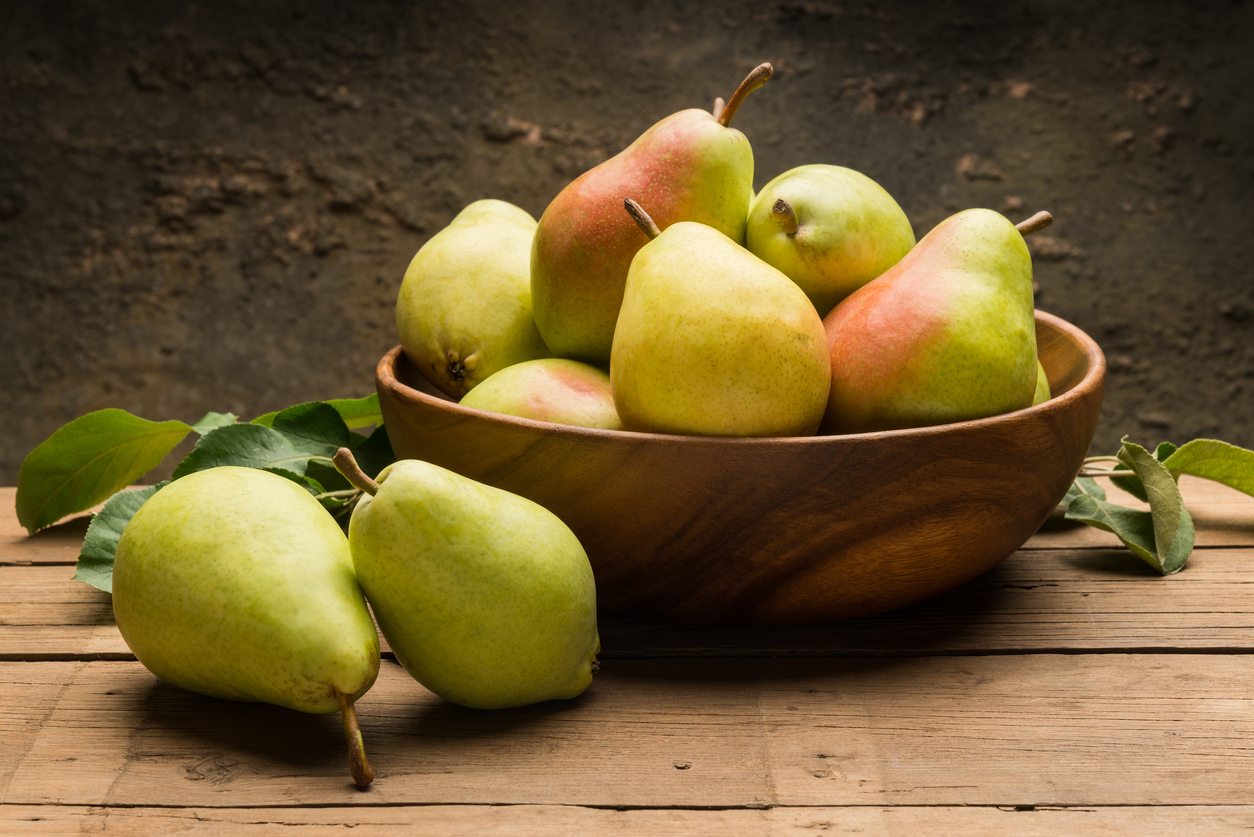Commitment + Clinical Leadership = Better Outcomes

7 Health Benefits of Pears
Pears are bell-shaped fruits that are known for their sweet, mild flavor. This fruit is native to Europe and West Asia and has been used for its anti-inflammatory and diuretic properties for thousands of years.1
Pears can be enjoyed in many ways, whether crisp, soft, or cooked. Here are 7 health benefits of pears.
Pears contain nutrients
Pears are nutritious and contain some important vitamins and minerals.2 Here are some pear nutrition facts:
- Copper – Copper plays a role in the immune system, nerve function, and cholesterol metabolism
- Potassium – Potassium aids in heart function and muscle contractions
- Polyphenol antioxidants – Antioxidants protect against oxidative damage
- Folate – Folate is necessary for cellular function and energy production
- Vitamin C – Vitamin C protects your cells against free radicals. It’s also necessary for the repair of all body tissues.
- Vitamin K – Vitamin K helps make proteins necessary for blood clotting and bone growth
Pears are good for digestion
Pears are one of the best sources of fiber, even having more fiber than one cup of kale, as well as other fruits and vegetables known for fiber content. With 6 grams of fiber, both soluble and insoluble, pears can help support your digestive system.3 Soluble fiber helps lower cholesterol levels and improves nutrient absorption. Insoluble fiber helps hydrate the body and moves waste through the intestines.4
Fiber helps feed healthy bacteria in the gut which then boosts your immune system. Fiber is also important when it comes to maintaining weight and reducing your risk of type 2 diabetes.
Pears improve kidney health
Pears are low in sodium, which can help prevent kidney disease. Kidney disease prevents your body from being able to properly balance sodium and water in the body.5
One study found that pears protected patients from kidney stones because of their high malic acid content.6 Kidney stones form when your urine contains more crystal-forming substances than fluid.
Pears may improve bone health
Pears contain copper, calcium, phosphorus, manganese, and magnesium, all of which are essential for bone health.7
Pears are also boron-rich, meaning they can help your body consume calcium more easily. Healthy bones lower your risk of osteoporosis, a condition that occurs when your bones are weak and brittle.
Pears have a low glycemic index
Pears have natural sugars, but the high fiber content helps to balance out your body’s glucose levels.3 Pears are also rich in anthocyanin, a chemical compound that helps prevent diabetes or make diabetes more manageable. This makes pears a great snack for those with diabetes.
With a low glycemic index, it also means that you won’t be hungry after snacking on a pear. Fiber slows down the digestion process, which allows your body to slowly break down the food and absorb healthy carbohydrates that give you energy.
Pears can improve heart health
Pears have high potassium content, making them a healthy choice for the heart. Potassium works by lowering blood pressure, which increases your body’s blood flow. Blood flow through the body provides oxygen to the organs.7
Pears also have flavonoid antioxidants, which help fight inflammation and diseases. High flavonoid intake has been found to protect people from heart disease because of its anti-inflammatory properties.
Pears benefit the skin
The fiber found in pears is beneficial to the skin and helps to keep it smooth. Fiber decelerates the discharge of sugar in the bloodstream. This is a positive because sugar spikes can lead to collagen damage.8
Collagen is necessary because it’s a building block for the skin that aids in elasticity and hydration. A lack of collagen can age your skin, as well as increase the time it takes to heal wounds. Vitamin C is also found in pears, which helps combat free radicals that can damage skin cells and ultimately harm the skin.9
Eating Pears
Pears are easy to add to your diet and have a versatile flavor that can be added to many dishes. They’re also typically available year-round in grocery stores. Here are some ideas to eat more pears:
- Eat a whole pear as a snack
- Add sliced pear to your favorite dish
- Cut up a pear and add it to your oatmeal
- Add sliced pear to your salad
- Roast or poach a pear to give it a different texture
- Add pear to your homemade fruit juice
- Add pear to your smoothie
- Add a roasted or poached pear to a chicken or pork dish
- Enjoy pear with cheese such as gouda or brie to complement it
- Bake pear as a dessert and top with cinnamon or chocolate
Try Pears Today
Now that you know about some of the health benefits of pears, try adding some to your diet today.
Saber Healthcare is an organization that provides services to more than 130 buildings across the states of Ohio, Pennsylvania, Virginia, North Carolina, Indiana, and Delaware. To learn more about our company and services, click here.
Saber Healthcare is an organization dedicated to providing consultant services to long-term care providers. This article is for informational purposes and is not meant to be seen as professional advice. Please consult with a medical expert before relying on the information provided.
Sources
- https://www.verywellfit.com/pears-nutrition-facts-calories-and-health-benefits-4114350.
- https://www.healthline.com/nutrition/benefits-of-pears.
- https://www.eatingwell.com/article/292095/4-surprising-health-benefits-of-pears/.
- https://www.saberhealth.com/news/blog/fiber-types-and-benefits.
- https://www.healthifyme.com/blog/benefits-of-pears/.
- https://pubmed.ncbi.nlm.nih.gov/26914114/.
- https://www.healthifyme.com/blog/pear-fruit/.
- https://www.stylecraze.com/articles/amazing-health-benefits-of-pears/.
- https://www.saberhealth.com/news/blog/collagen-health-benefits.
